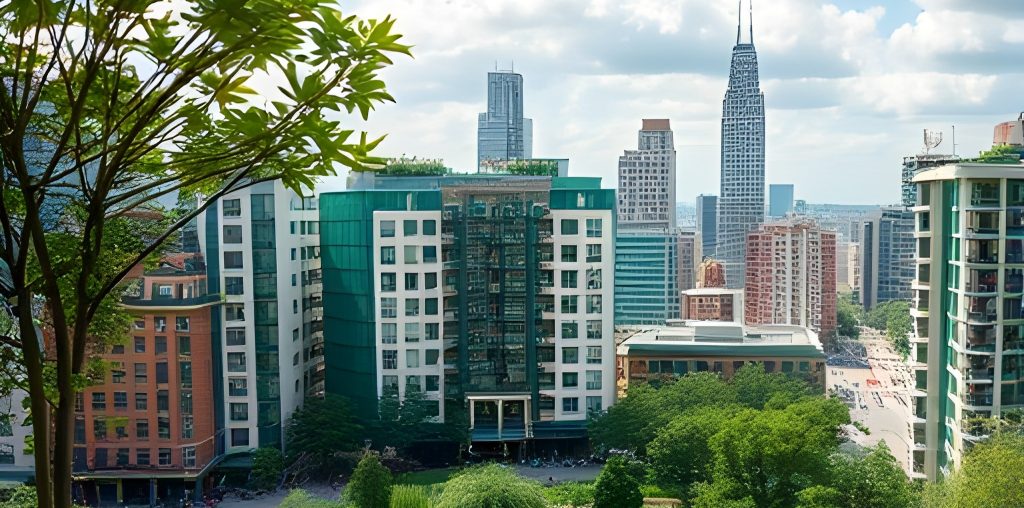Sustainable city is a well-planned urban area that prioritizes social equity, environmental protection, and economic growth. It provides affordable housing, efficient transportation and ample green spaces.
Date: November 05, 2024
As Bangladesh grapples with the aftermath of a devastating flood, one thing has become abundantly clear – the resilience and solidarity of its people, especially its youth, shines brighter than ever before. In the face of adversity, young Bangladeshis have once again demonstrated their unwavering commitment to supporting their communities and driving positive change.
This remarkable display of youth power underscores a crucial realization: the young population of Bangladesh holds immense potential to lead the country’s march towards sustainable development. With the United Nations’ 2030 Agenda for Sustainable Development setting the stage, it is time to harness the energy, enthusiasm, and innovative spirit of the youth to transform Bangladesh’s cities into vibrant, resilient, and environmentally conscious hubs.
The Challenges of Urban Sustainability in Bangladesh
Bangladesh’s rapidly growing cities are facing a myriad of challenges that threaten their long-term sustainability. From water logging and environmental pollution to poor waste management and traffic congestion, the major urban centers of the country are grappling with a multitude of issues that compromise the quality of life for their residents.
A recent study on waste management in Bangladesh revealed that the capital city of Dhaka alone produces a staggering 6,250 tons of waste daily, with the city corporations’ efforts to manage this burden proving inadequate. Despite the implementation of the Solid Waste Management Rules 2021 and the incorporation of the National 3R (Reduce, Reuse and Recycle) Strategy, the overall waste collection rate remains alarmingly low.
The path towards sustainable cities in Bangladesh, therefore, requires a fundamental shift in approach – one that harnesses the energy and ingenuity of the country’s youth to address these pressing challenges from the ground up.
Empowering Youth for Sustainable Urban Development
The youth of Bangladesh are not mere bystanders in this journey towards sustainable cities; they are poised to be the driving force behind it. Armed with a deep understanding of their local communities and a genuine desire to make a positive impact, young Bangladeshis can play a pivotal role in tackling the urban sustainability challenges their country faces.
One of the key areas where youth can contribute significantly is in the realm of waste management. By spreading awareness about waste reduction, monitoring the waste collection process, and developing innovative disposal methods that move beyond the traditional landfilling approach, young Bangladeshis can help transform the way their cities handle this pressing issue.
Moreover, the youth can actively participate in disaster management initiatives, equipping themselves with the necessary skills and knowledge to minimize risks and ensure faster recovery in the face of calamities. Local government bodies can work hand-in-hand with young leaders to establish specialized groups for early warning systems, shelter preparation, and rescue and relief operations.
Beyond these critical domains, the youth can also play a pivotal role in the creation and management of green spaces within their cities, contributing to enhanced environmental quality and overall sustainability.
Empowering the Youth: A Holistic Approach
To harness the full potential of Bangladesh’s youth in driving sustainable urban development, a holistic and collaborative approach is needed. This involves providing the necessary resources, knowledge, and support to empower young Bangladeshis and enable them to become agents of change.
Local government bodies can lead the way by offering part-time employment and certification opportunities to youth volunteers engaged in waste management, disaster response, and green space initiatives. This not only incentivizes their participation but also recognizes their valuable contributions to the community.
Furthermore, collaboration between local authorities, private organizations, and non-profit entities can create a robust support network for young changemakers. By pooling resources, expertise, and training programs, these stakeholders can equip the youth with the skills and knowledge they need to tackle complex urban challenges effectively.
The Ripple Effect of Youth-Led Sustainable Development
As young Bangladeshis take the lead in shaping the sustainable future of their cities, the impact of their efforts will reverberate far beyond the local level. By demonstrating the power of youth-led initiatives, these changemakers can inspire and empower their peers across the country, catalyzing a grassroots movement for sustainable urban development.
Moreover, the success stories of youth-driven projects can serve as a blueprint for other cities in Bangladesh, encouraging the adoption of innovative, community-centered approaches to tackle pressing urban issues. This ripple effect has the potential to transform the landscape of sustainable cities nationwide, setting the stage for a more prosperous and resilient future.
Investing in the Future, Empowering the Youth
As Bangladesh navigates the path towards sustainable development, the role of its youth cannot be overstated. These young changemakers possess the energy, the creativity, and the passion to tackle the urban challenges that their country faces, from waste management and disaster response to environmental conservation and green space creation.
By investing in the capacity-building and empowerment of Bangladeshi youth, we can unleash a transformative force that will not only enhance the resilience and environmental quality of the country’s cities but also empower the next generation of leaders to shape a more sustainable future.
The time is now to harness the power of youth and channel their enthusiasm towards building the sustainable cities of tomorrow. Through collaborative efforts between local authorities, private entities, and the young people themselves, Bangladesh can forge a path towards a more inclusive, resilient, and environmentally-conscious urban landscape – a testament to the unwavering spirit and boundless potential of its youth.
Resources:
- https://www.thedailystar.net/star-youth/news/guiding-the-youth-towards-building-sustainable-nation-3692736
- https://asef.org/wp-content/uploads/2021/11/ASEFSU23-Background-Paper_Waste-Management-in-Bangladesh.pdf
- https://www.sciencedirect.com/science/article/abs/pii/S0959652619311837

[…] region’s vibrant tourism sector, allowing visitors to once again immerse themselves in the breathtaking beauty of this southeastern part of the […]
[…] bonds and sustainable financing […]